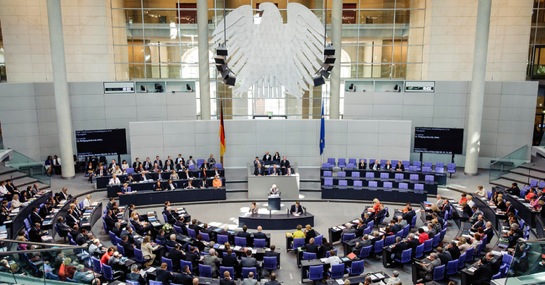
On June 7th, Chancellor Merkel of Germany, PM Cameron of the UK and PM Stoltenbergof Norway took a break from their busy schedules to discuss the future of global and German democracy with local and international students studying in Berlin.
This meeting was part of a bigger initiative aimed at creating a series of dialogues between citizens and the state about the relationship between them, and about issues of national, regional and international importance. The entirety of the event took place at The German Federal Chancellery here in Berlin.
Receiving an invitation for this event was in itself a unique experience. Coming from a political culture where the relationship between the citizens and the state had long been governed by fear, mistrust, and most importantly, great physical and ideological distance, the idea of meeting with heads of governments had never crossed my mind as valuable, let alone possible.
It seemed to me, however, that the purpose of the whole event was to a large extent to make a statement against exactly that kind of political culture: leaders are not superior but merely citizens who have been delegated certain tasks so that the rest of their fellow citizens may go on doing things they feel are of personal importance. And on that note the dialogue commenced, with students ‘firing’ on topics ranging from the Eurozone fiscal crisis to the very nebulous concept of European identity.
But before the debate could start, we the participants had a long schedule ahead of us. At 9.30 sharp, and after a surprisingly stress-free security check, we headed for a brief introduction given by one of the Chancellery’s staff as to how the event would unfold.
We were introduced to the debate’s moderator Stefan Kornelius of the Süddeutsche Zeitung, he ran us through the rules of debate and encouraged a “no holding back policy” when it came to asking questions. Lightheartedly, he joked, “this is my fourth Chancellor, leaders come and go, but you are here to stay.”
We were then divided into three groups: two German-speaking ones and an English-speaking one, and then given a rather exciting tour of the Chancellery. In addition to covering information one would expect, such as the architectural choices that went into the building of the Chancellery, our guide was kind enough to share some of her experience with the various chancellors that occupied the building, and how these experiences came to alter the very architecture and history of the Chancellery.
Mr. Schroder for example was allegedly fond of throwing rather generous parties for reporters, and as a result the inner walls of the Chancellery are no longer in their original white color, but were repainted with colors of the four virtues to minimize the cost of constantly bleaching the walls, in the aftermath of said parties.
Following the tour we were then taken into a workshop, as a sort of preparation for the debate. The task was to answer three main questions: What will the future of democracy look like in 2022? What are the main issues on the agenda? And in that process how can various nations and organizations learn from each other? Participants were paired and given two pieces of yellow paper and after discussing each of the questions were asked to jot down key words that came up during the discussion.
Then gradually but surely, a room that was, mere minutes before, filled with what can be described as awkward silence, was now bustling with enthusiasm and fascinating discussion. After each of the rounds students paused for a group discussion on the proposed points. These proved as diverse as the participants themselves, with topics ranging from the role of corperations in a democracy to the relationship between truth and transparency within the public sphere.
The debate itself took place in an amphitheatre-like lounge; with the heads of governments seated on the stage at the bottom, the students sitting in the surrounding circular structure, and, at the very top, eager member of the press. Seated among these talented individuals, with the seemingly endless clacking sound of camera shots, I was slightly intimidated but expected nothing less of inspiration.
As the debate ensued, I was gradually overcome with a sense of comfort, as the questions were all coming from a place of great concern, thought and, most importantly, knowledge and imagination; the word ‘inspiration’ does the spirit of the interlocutors insufficient justice. I left the debate with a renewed sense of faith in what educated, motivated and aware individuals can one day achieve, for themselves and the future.
I can’t say that I came out of the debate with a clear idea of what my relationship with the state should be like, but I do have an idea as to what it definitely shouldn’t be like. The relationship between the citizen and the state is an ever-changing, ever-evolving venture and one that resists simplicity by its very nature.
It takes invested time and effort to get something good out of it and like all relationships, it is entirely in the hands of those involved. Distance can be created, but most easily materializes as a by-product of apathy. Whether it’s through activism, participation or dissent, a dialogue needs constantly to take place, even if it at times seems like more of a monologue.
As I stood in the elevator on my way out, I couldn’t help but overhear a few reporters chatting about the event: “Don’t worry, we’ll get them next time,” said one to his more somber-looking colleague. I was then reminded that it is indeed our responsibility to keep that distance under a close, careful watch, because if we don’t there will always be those willing to jump in to fill the gaps, and for them ‘next time’ could encompass nightmare possibilities, and eagerness to direct energies in a non-constructive way is always in supply.
by Aya Ibrahim (1st Year BA, Egypt)
